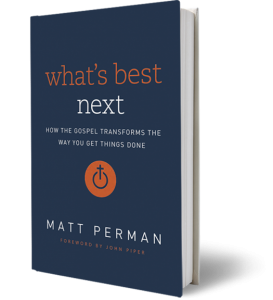Review of What’s Best Next: How the Gospel Transforms the Way you Get Things Done by Matthew Perman (Zondervan, 327 pp., 2013, £3.99 Kindle edition).
 As someone who recently entered pastoral ministry, I now have the responsibility of using my time and energies effectively in the Lord’s work, and for that reason I was drawn to read this book on productivity, drawing from the secular literature on the subject, but written from a distinctly Christian perspective.
As someone who recently entered pastoral ministry, I now have the responsibility of using my time and energies effectively in the Lord’s work, and for that reason I was drawn to read this book on productivity, drawing from the secular literature on the subject, but written from a distinctly Christian perspective.
I would never have expected that any book would make me reflect on my personal mission statement, yet Perman builds so robust an argument for this, drawing from Scriptural and Puritan examples, that he compels response. He points out that it does not matter how efficient you are if you are doing the wrong things, and therefore that every individual requires a clear sense of their purpose in life, and to see all their activities as flowing from and centred on that purpose. As believers, we recognize that God defines our purpose, but that we seek His wisdom as individuals to know how that purpose is to be worked out in practice – hence the importance of our values and beliefs informing our goals in life, whether professional or personal.
Perman demonstrates that Scripture consistently teaches that our goals in life must be directed towards the benefit of others, and that this concern for others is invariably presented as the path both to effectiveness and also to true and lasting happiness. He emphasizes that this Christian love must be felt in all the “roles” that we have, both in individual, family, social and working life, and urges sustained reflection on how effective we are in each role as part of our weekly planning for productivity and effectiveness.
The book is also helpful in terms of the practicalities of productivity, emphasizing that “to-do” lists are not enough, that we require careful scheduling of our time, to allocate our energies in a balanced way to the different tasks and activities of our lives. He stresses that planning can be as much about excluding tasks that are trivial and unproductive, as about defining and scheduling what is crucial to our purpose for each week. The examples he gives of this, and of how technology can assist in the practicalities of working life, are useful and helpful. As Christians, we must believe in excellence, and shepherd our time and energies accordingly. This leads to the central question of the book, from which it derives its title: “What’s the best thing I can do next with my time?”
Reservations about the book would stem mainly from its New Calvinist origins. I really wish that, with all the focus on planning the week in this volume, the importance of Sabbath rest to true effectiveness had been stressed; and thus a vital Scriptural lesson on productivity was ignored. Furthermore, as a thoroughly Old Calvinist, I would appreciate a greater stress on the reality of the battle with daily sin and repentance as key to the difficulties of productivity, and I think this emphasis would have added a richer spiritual dimension to the book. Laziness is a product of the Fall, and so is ineffectiveness. I do appreciate that Perman stresses the need for daily devotions as essential to a productive walk with God, and warns against neglecting this from our planning.


Leave a Reply